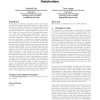Free Online Productivity Tools
i2Speak
i2Symbol
i2OCR
iTex2Img
iWeb2Print
iWeb2Shot
i2Type
iPdf2Split
iPdf2Merge
i2Bopomofo
i2Arabic
i2Style
i2Image
i2PDF
iLatex2Rtf
Sci2ools
156
click to vote
SACMAT
2009
ACM
2009
ACM
Dynamic mandatory access control for multiple stakeholders
In this paper, we present a mandatory access control system that uses input from multiple stakeholders to compose policies based on runtime information. In the emerging ubiquitous environment, many devices run software whose access permissions depends on multiple stakeholders, such as the device owner, the service provider, the application owner, etc., rather than a single system administrator. However, current access control administration remains as either discretionary, allowing the running and perhaps compromised process to administer, or mandatory, requiring all permissions to be known by load-time. A key problem is that users may download arbitrary programs to their devices, requiring that the system contain such programs while allowing some reasonable functionality. However, such programs may need access to resources that can lead to attacks, such as implementing voice-over-IP calls, but that may also be needed for benign operations. In our approach, we use a “soft” sandbox...
Related Content
| Added | 28 May 2010 |
| Updated | 28 May 2010 |
| Type | Conference |
| Year | 2009 |
| Where | SACMAT |
| Authors | Vikhyath Rao, Trent Jaeger |
Comments (0)

